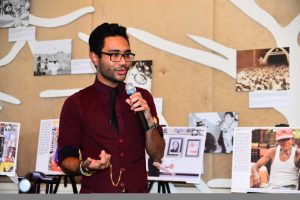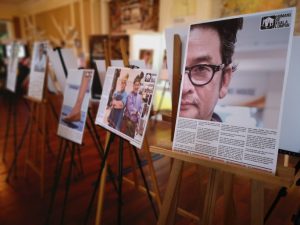The son of a pisang goreng and cakoi seller who went on to establish his own website management startup, which now manages over 35,000 domains. A former chief operating officer of a chemical company who left a 20-year corporate career upon realising he had virtually sold his soul at the expense of his family life. A couple in an old folks’ home longing to reunite with the son who abandoned them.
These are just some of the real, relatable and sometimes heart-wrenching stories of the Humans of Kuala Lumpur, a digital platform which documents the transformation and diversity of Malaysians through photo stories and videos. Inspired by the Humans of New York photo project on the inhabitants of New York City which has gained a global following, the Kuala Lumpur iteration was initiated by Mushamir Mustafa, a freelance photographer/photojournalist.
Born in Bangladesh to parents working in the foreign service, Mushamir counts Kosovo, Brazil and Namibia as places he called home when growing up, creating a void on his knowledge of his native Malaysia. “I was only around 10 or 11 years old when I first saw KLCC!” Mushamir says of his first recollection of Malaysia during a visit in 2005. The Humans of Kuala Lumpur project became his way of connecting to his home country, which he only returned to settle in as a secondary student in 2009.

In an interview with Transformation Today, Mushamir shares how he started the photo-story project in 2012 during his university days. It was driven firstly by his interest to get to know Malaysia and Malaysians as well as his penchant for striking up conversations with strangers.
It then grew into a passion for Mushamir as he continued to meet interesting people with compelling and inspirational stories.
He also realised that at the time, there was an absence of the recording and preservation of the stories of everyday Malaysians as no media locally covered such stories of people on the ground. As he immersed himself in the project, he found that beyond documenting Malaysian lives, Humans of Kuala Lumpur had the potential to become a platform for social advocacy.
He began to choose causes to advocate, such as homelessness, and sought out relevant people to tell their authentic stories on those subjects. “I realised that we had the power to educate society on particular causes while giving a voice to those who don’t have one,” says Mushamir.
Six years into his venture, Humans of Kuala Lumpur has amassed close to 700 published and unpublished stories. Published stories are shared on its website and social media platforms which have counted 20 million organic/unpaid views. Starting with just Mushamir armed with his camera, the Humans of Kuala Lumpur is now made up of 15 contributing photographers and videographers who actively seek unique Malaysians to profile. Members of the public are also invited to submit their stories to the platform. The project, which remains independently funded by Mushamir himself, reached a milestone this year with the showing of its inaugural exhibition running throughout September 2018 at Carcosa Seri Negara.
In undertaking Humans of Kuala Lumpur, Mushamir has found that the stories told on the platform resonate with audiences due to its relatability. “You could be rich or poor and be of any colour or creed, but when you read the stories, you feel like you’ve been through the same experiences or you can learn something from it,” he says. He has also observed that the platform’s power to educate the public on the issues facing their fellow Malaysians also serves to inspire audiences.

On what’s next for the venture, Mushamir hopes that Humans of Kuala Lumpur, which is also the first ‘Humans of’ instalment in Malaysia and has the largest social media following of over 100,000, will become self-sustaining.
Additionally, while the platform does currently include stories of Malaysians outside of Kuala Lumpur, he aims to increase its coverage further and promote greater inclusiveness.
While Humans of Kuala Lumpur was born simply out of one young man’s curiosity and desire to find the untold stories of a homeland he did not know much of, Mushamir has also discovered the transformative force of his work.“Stories, either those you read, hear from others or even tell yourself, can transform people. I hope that when we write and tell stories, people will see the common humanity in everyone else and be inspired to transform into a better person. We are all stories in the end, so make it a good one.”